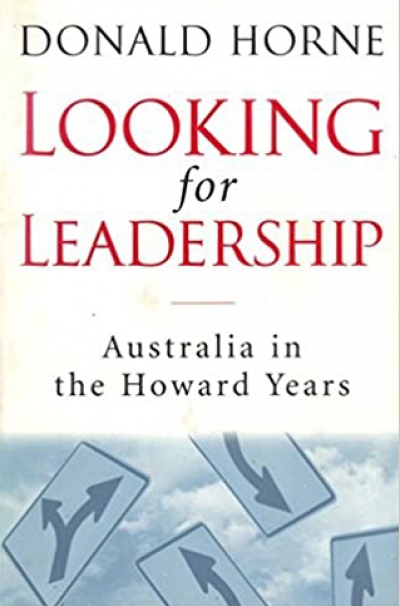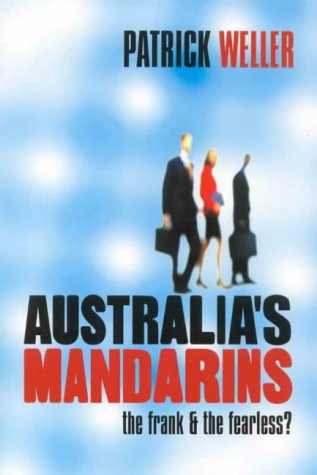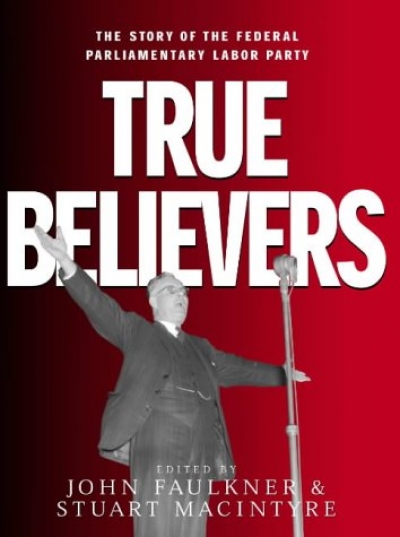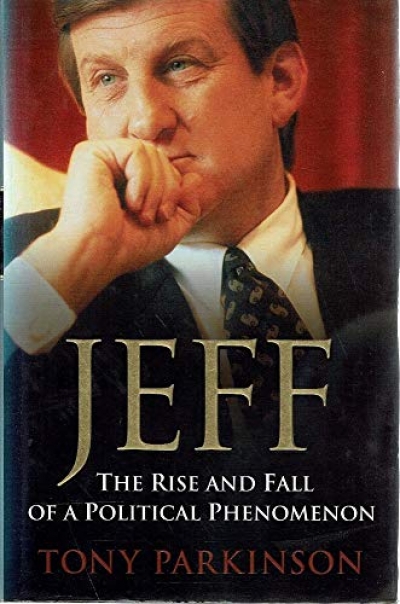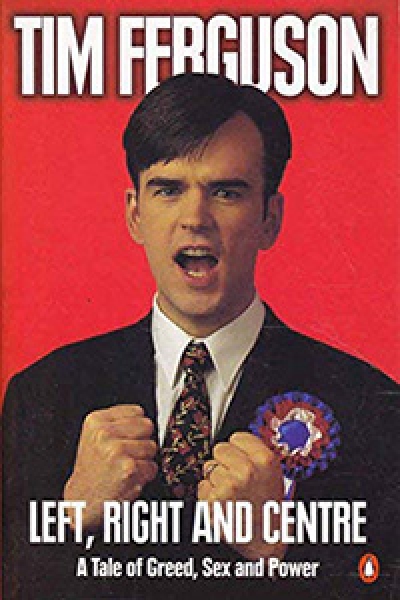Australian Politics
Looking for Leadership: Australia in the Howard Years by Donald Horne
London 1999. I’m in a draughty slum in Hackney, the poor part of the East End, shared with a mini-UN of students, squatters, drifters and a junior investment banker. Feeding five-pound notes into the gas meter, keeping an eye out the window for the television licence detector van, we’re doing what everyone who comes to cool Britannia does most evenings – watching the BBC ‘cos we can’t afford to go to the pub. Suddenly, the screen seems to widen and there’s Sydney Harbour in all its luminescent glory, with an expert panel of worthies – Bob Hawke, Bill Hayden, Geoffrey Robertson – arrayed before it.
... (read more)Australia's Mandarins: The Frank and the Fearless? by Patrick Weller
On May 24 this year, a memorial service was held in the Great Hall of Parliament House. The great and the good were there in force. They were marking the death of Sir Arthur Tange, widely regarded as the last of the great public service mandarins who flourished from the 1940s to the 1970s. Although the usual partisan conflicts were temporarily suspended, an element of controversy intruded. In his eulogy, Malcolm Fraser lamented that changes to the public service meant that ministers today and tomorrow would not have the benefit of the frank, fearless, non-partisan ad-vice of the kind that he had received from Tange. The next eulogist, Alexander Downer, felt compelled to give an unscripted response, asserting that he and his ministerial colleagues did indeed receive advice of comparable quality and independence from their departmental secretaries. The third eulogist wisely stayed clear of the debate, although his views would have been highly relevant, for Dr Allan Hawke occupies the last position held by Tange, that of Secretary of the Department of Defence.
... (read more)The True Life of Jimmy Governor by Laurie Moore and Stephan Williams
Five of Laurie Moore’s ancestors were in the party that finally captured Jimmy Governor in October 1900, ninety-nine days after his murderous onslaught on the Mawbey family. He and his wife have assiduously traversed the terrain of the manhunt for Jimmy and his brother Joe. Moore’s book, The True Life of Jimmy Governor, written in conjunction with Stephan Williams, is an admirable amateur labour: loving, painstaking, yet never without a tinge of irony about fashions of remembering folk anti-heroes in Australia. As the authors remark near the end of their story: ‘the brothers held up, or were fed by, everyone’s great aunt or grandfather’.
... (read more)Drugs and Democracy: In search of new directions by editors Gregory Stokes, Peter Chalk, and Karen Gillen
The failure of the current system of drug prohibition was evident right from the start. Quong Tart, tea importer, socialite, lacrosse champion, and indefatigable anti-opium campaigner, insisted that banning its import would ‘stamp out the evil within twelve months’. That was in 1894.
... (read more)In February 1996, as Australians prepared to elect the Howard government for the first time, Paul Keating addressed a trade union rally at the Melbourne Town Hall. Keating, knowing but not accepting that he would soon be ejected from the prime ministership, ran through a commentary on the leading figures in the Liberal–National coalition. Keating’s message was that these people were second-rate and would disgrace Australia if they won power. In reference to the National Party leader, Tim Fischer, Keating attracted a big laugh when he averred: ‘You know what they say – no sense, no feeling.’ Keating, who had previously described Fischer as ‘basically illiterate’, regarded his opponent as a joke. He was not alone. There were worries about whether Fischer would be up to the task of holding down a senior ministry, especially his chosen portfolio of trade, and of serving as acting prime minister when John Howard was ill or out of the country.
... (read more)True Believers: The story of the Federal Parliamentary Labor Party edited by John Faulkner and Stuart Macintyre
The intriguing story of the Federal Parliamentary Labor Party began the day before the first Federal Parliament convened in Melbourne on 9 May 1901. At 11 a.m. on 8 May 1901, Labor’s twenty-two federal parliamentarians met in a stuffy basement room in Victoria’s Parliament House. This historic first Federal Caucus was chaired by Queensland Senator Anderson Dawson who from 1 to7 December 1899, as premier of Queensland, had led the first Labor government in the world.
... (read more)Jeff: The rise and fall of a political phenomenon by Tony Parkinson
Political biographies are renowned as being notoriously difficult to write. Given the peculiar role of authorisation this is not surprising. The ‘authorisation’ – the act of writing – of a political biography is diminished and crowded out by a subject who not only defines the work’s content, but can literally refuse to authorise the text. In this context, Tony Parkinson’s biography of Jeff Kennett, Jeff: The rise and fall of a political phenomenon, runs up against a subject who is particularly adept at controlling the manufacture of his personal and public self. Parkinson’s biography is unauthorised, but has survived its subject’s scrutiny.
... (read more)Two Nations: The causes and effects of the rise of the One Nation Party in Australia edited by Robert Manne
Even if Pauline Hanson’s One Nation Party were to self-destruct after the next federal election, which I suspect is a real possibility, it has earned itself a position in Australian political history. Hanson herself must be one of our most remarkable political figures, having risen within three years from the obscurity of a Liberal nominee for an unwinnable electorate to a politician with media coverage almost equivalent to that of the major party leaders.
... (read more)Murray Whelan – Labor Party fixer, spin doctor, branch-stacker, deal broker and, above all, true believer (his son’s middle name is Evatt) – returns for another tilt at the system in this entertaining and highly successful series. Presumably, our aptly named anti-hero was once good at his job, because these days everything he touches goes pear-shaped before you can say ‘travel rort’ or ‘credit card’. It isn’t necessarily his fault, but blame must attach somewhere in politics. Well-intentioned though he is, Murray is incurably prone to accidents and bad luck. If there is a banana skin within coo-ee, he will slip on it; if there is a dumpster in the vicinity, he will end up inside it. He is, in short, the bunny, a virtuous paragon of hapless endeavour. With Murray Whelan on the case, a policy initiative soon becomes an exercise in damage control.
... (read more)Left, Right and Centre: A tale of sex, greed and power by Tim Ferguson
Still fondly remembered as one of the Doug Anthony Allstars, although most recently known for biding his time in the depths of Channel Nine between those twin peaks of high culture, Don’t Forget Your Toothbrush and Little Aussie Battlers, Tim Ferguson has obviously not been idle, instead indulging in everyone’s favourite pastime – Canberra-watching. Inspired (or possibly horrified, if Left, Right and Centre is anything to go by) by what he has seen, Ferguson has created a monster – Luther Langbene.
... (read more)

